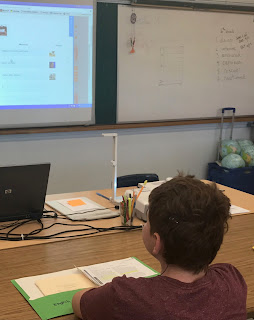By Eric Sherman
School is back in session. Is your child prepared? I’m sure you’ve already purchased items such
as, backpack, pencils, paper, pens, etc., but what about your child’s cochlear implant(s)?
If you are like our family and sending your
child off to school with cochlear implants, there are things you should know to
help your child succeed in the classroom.
Cochlear implants have been around for more than 30 years,
but it is amazing how few schools or teachers are aware of this wonderful
technology. In our experience, most
teachers and schools have never worked with a student who has cochlear
implants, and we are in the second largest school district in the country.
The population of school aged children receiving cochlear
implants is growing. Unfortunately, parents have to make sure teachers and
schools are educated about their child’s cochlear implants and hearing needs. If you child is entering a public school in
the U.S. with a cochlear implant, you should have an IEP or a 504 plan agreement
in place. These are legal documents
under the Individual Disability Education Act (IDEA) to insure your child receives
the necessary support in the classroom.
The Individualized Educational Program (IEP) or a 504 plan
is developed to ensure that a child with a disability receives specialized
instruction, related services, and accommodations that will ensure their
academic success and access to the learning environment. Similar laws or rights may exist in other
countries.
 |
Classroom seating arrangement is important
to the success of a DHH student.
|
When appropriate accommodations are provided children with
cochlear implants do very well in mainstream classrooms or in a special
education programs. We have found that the
following steps are helpful to our child’s success in the classroom:
- Pack a bag in your child’s backpack with extra accessories (i.e. sound cord, audio jacks, etc.), batteries and troubleshooting instructions with your contact info.
- Make sure the school has appropriate assistive listening equipment in place, per IEP or 504 plan, at the start of school year. This is generally an FM system that can directly connect to your child’s processor(s).
- Meet with teachers during the first week of school and explain how the cochlear implant works, troubleshooting, etc. If your child is old enough or has the ability to advocate for themselves, great! If not, you’ll still want to discuss the following:
o Optimal seating for hearing needs in the
classroom
o How to change batteries, sound cords and
headpieces, different programs on processor
o Breaks if needed. The sounds of a noisy classroom can be
overwhelming for some children and small breaks can be helpful.
o Possible behaviors that might occur if the processors
aren’t working properly
o Speaking naturally, in a clear voice, not talking
to fast or shouting
o Making sure child is following along with
instruction
o Repeating questions and answers during class
discussions
o When using audio & video equipment making
sure it can connect to assistive listening equipment
o Explaining to the teacher the importance of using
the assistive listening equipment (i.e. FM system, Roger Pen, etc.)
Every child entering school has different hearing
needs and it’s good to look for resources that will best support your
child. We found Advanced
Bionics Tools for Schools had a pretty comprehensive list of materials.
They have communication logs, tips for teachers, assessment tools, as well as
other information that could be helpful in addressing your child’s needs.
If your child participates in school
sports, extra-curricular activities, or just plays on the playground, make sure
you have an accessory that secures and helps protect the processors. Our
son uses the specialty shirt Ci Wear to secure his devices.
It’s important to be involved and collaborate
in your child’s education. Nobody knows
your child’s hearing needs better than you do.
The more the school knows the greater success your child will have in
the classroom.
If you like stories like this, we invite you to subscribe to our blog as well share with others.